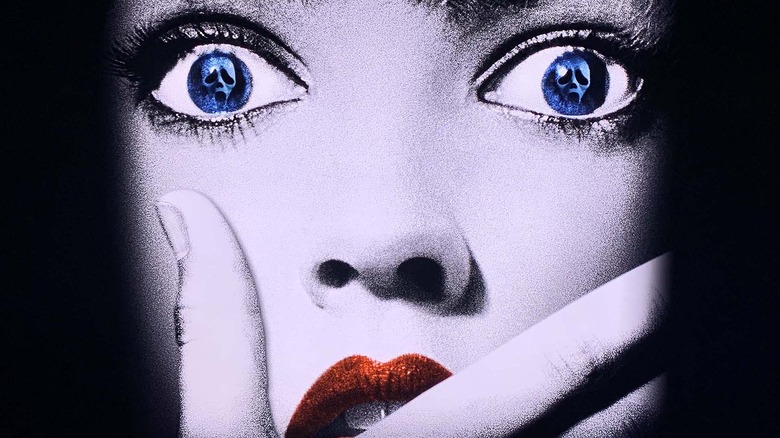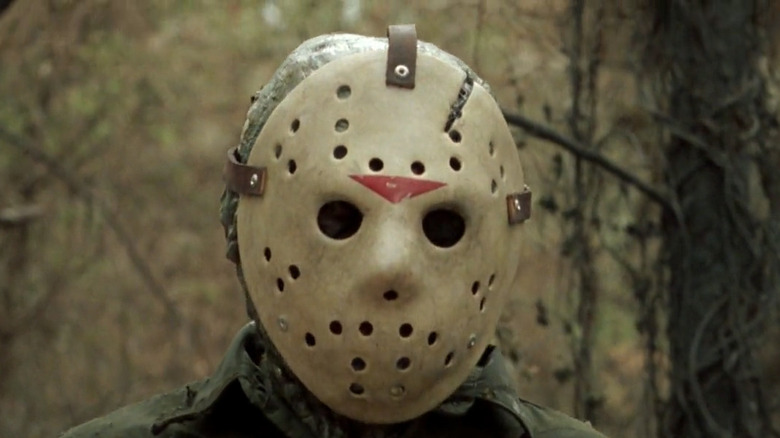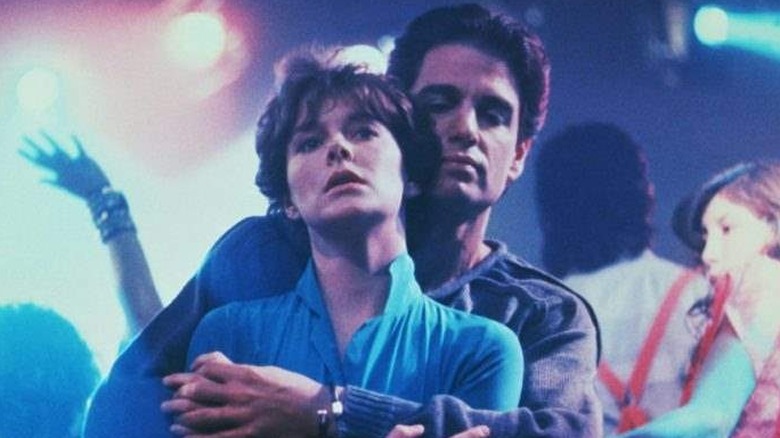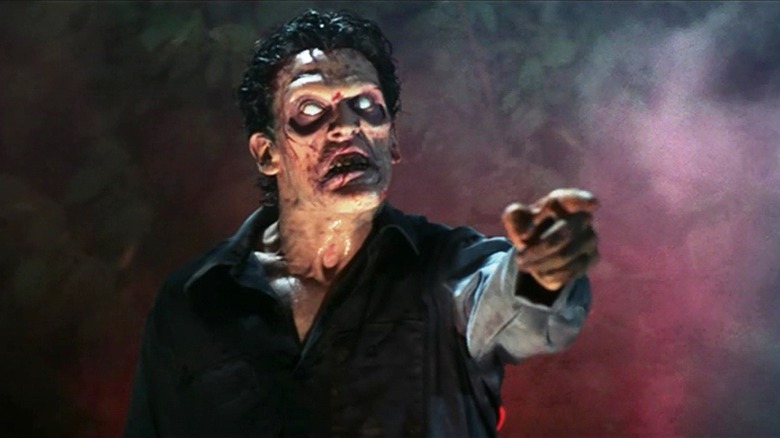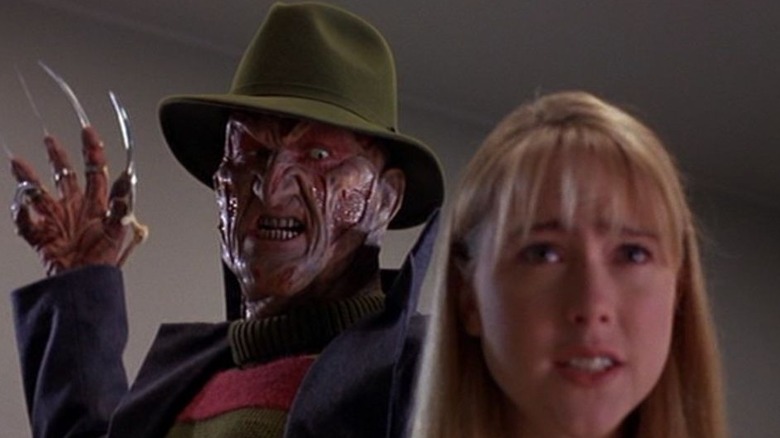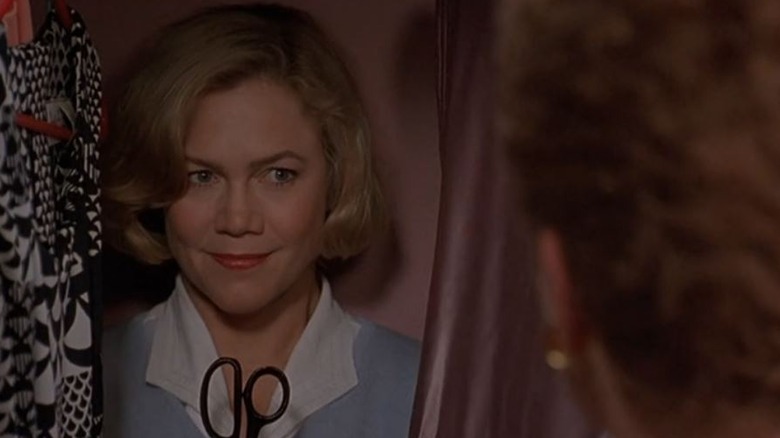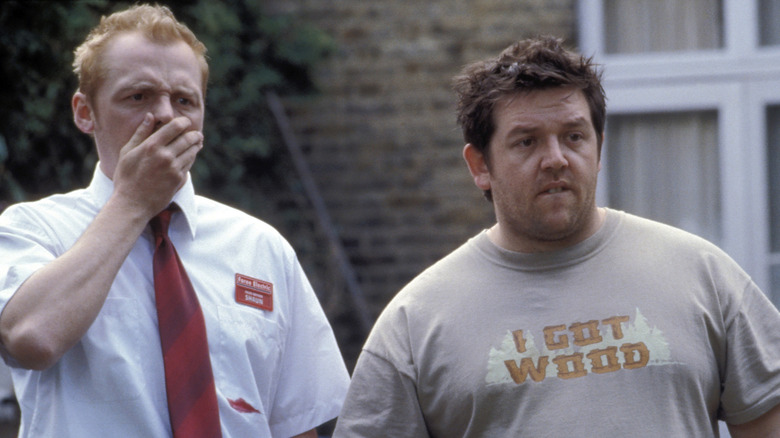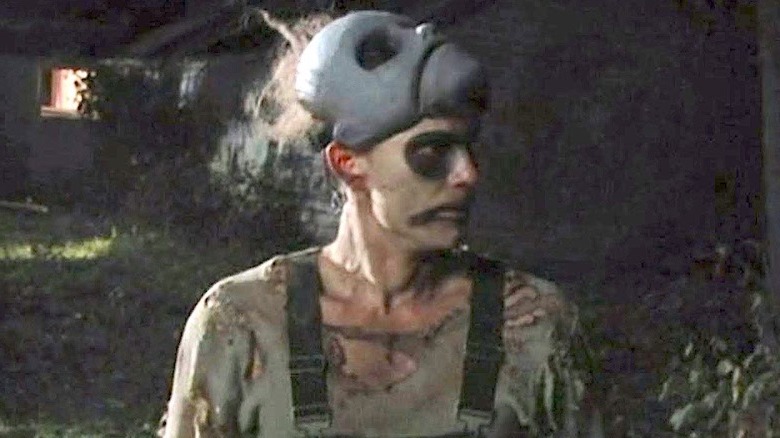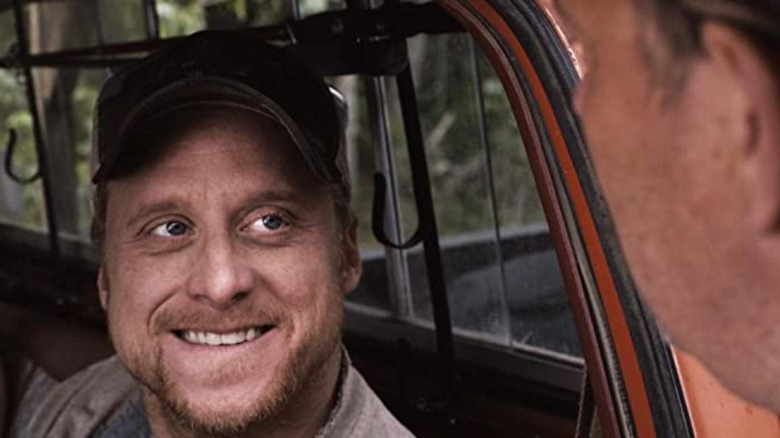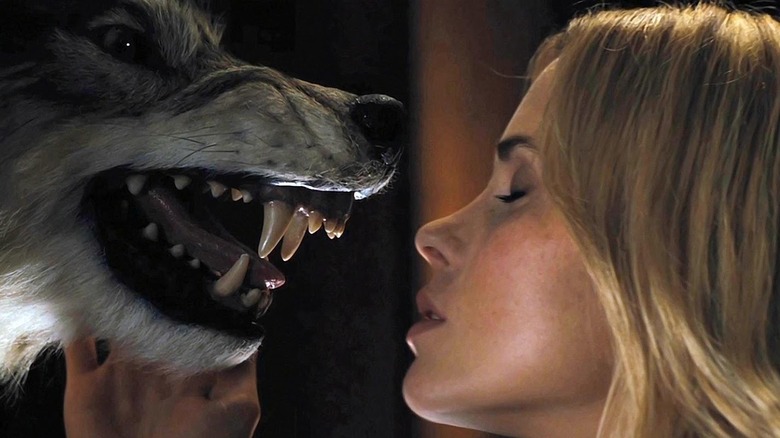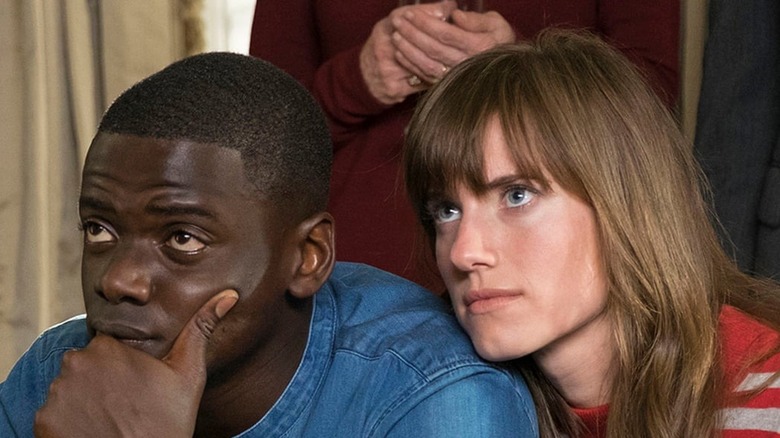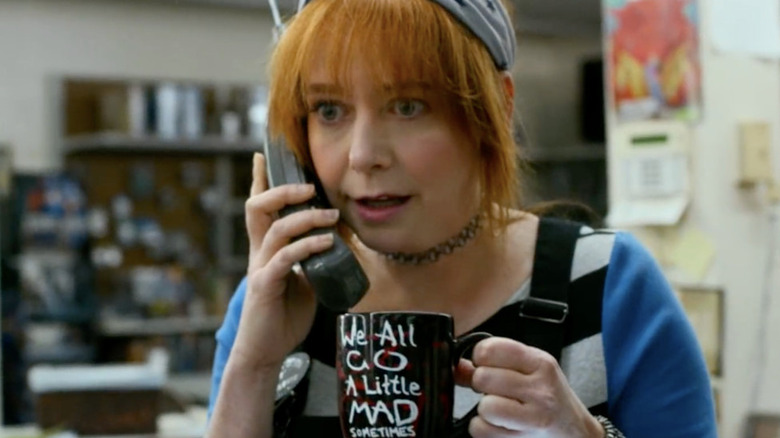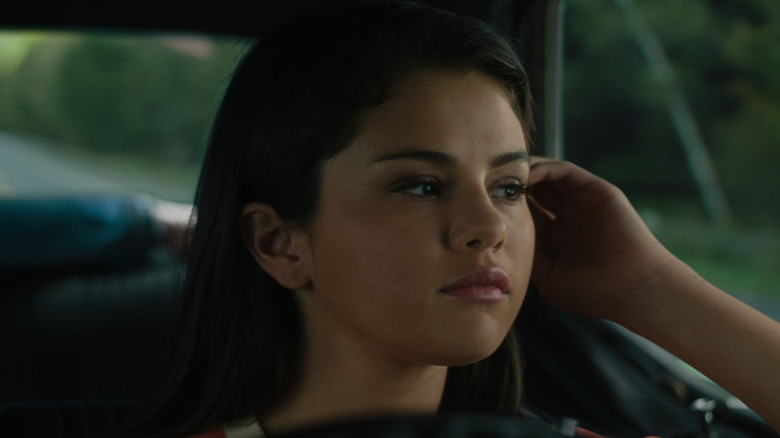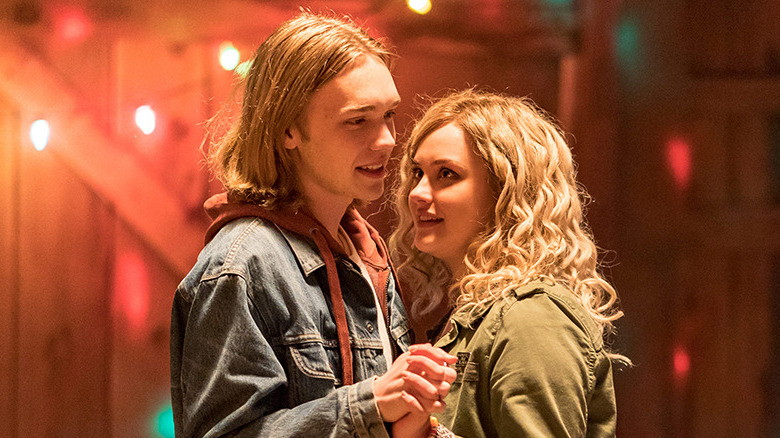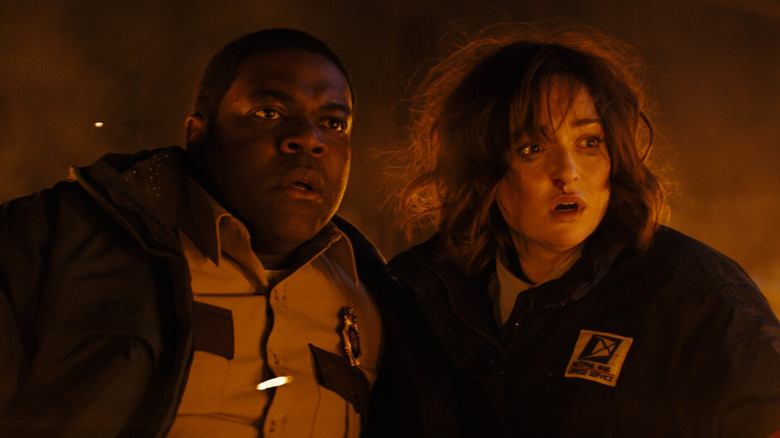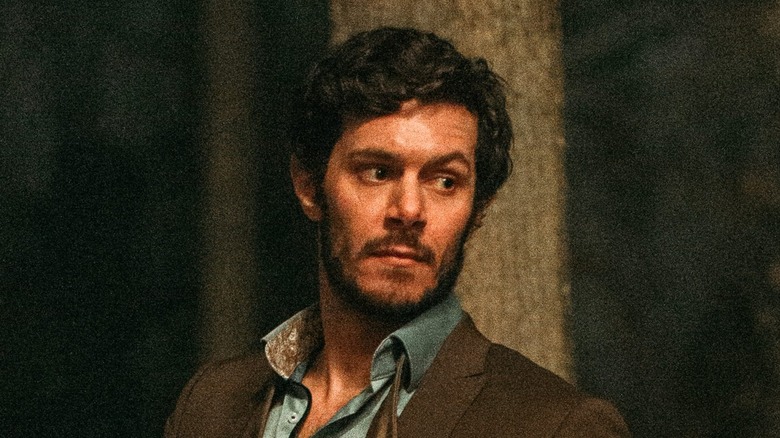Movies Like Scream Meta Horror Fans Need To Watch
The meta horror genre, which is another way to just say self-aware and self-referential horror, often straddles the line between fear and laughter while subverting horror clichés and tropes and commenting on popular culture and themselves. In 1996, Director Wes Craven and writer Kevin Williamson helped define the meta horror genre with "Scream." Now, years after the cast and crew made history with this intertextual classic, a fifth installment and soft reboot of the franchise has arrived. The 2022 "Scream" is the first installment of the franchise produced without the late Craven, and some franchise alums expressed concerns about doing anything without him. But the new team managed to win over stars Neve Campbell, Courteney Cox, and David Arquette with personal letters. In fact, Matt Bettinelli-Olpin and Tyler Gillett, of the Radio Silence filmmaking collective, confessed that the OG "Scream" played a direct hand in inspiring them to become filmmakers in the first place. With Williamson on board as an executive producer, it's easy to see why fans were anxious to get to the movie theater for this one.
To help celebrate the enduring legacy of "Scream," we've compiled a list of other meta horror entries worth checking out. This one's for all the people who just can't seem to get enough of this playful horror genre!
Friday the 13th Part VI (1986)
The first "Friday the 13th" established the classic "you have sex, you die" horror trope, and the "Friday" entries that followed were largely straight-faced slashers until the fan favorite "Friday the 13th Part VI: Jason Lives," which is often given credit for inspiring "Scream." Ten years before Ghostface first terrorized Sidney Prescott and the town of Woodsboro, writer/director Tom McLoughlin penned this cheeky sixth installment, which embraces the comical aspects of its franchise and features quippy dialogue and likable characters. One character even comments that they've "seen enough horror movies to know any weirdo wearing a mask is never friendly."
With its spunky final girl and its references to horror movies like "Alien," "Frankenstein," and "White Zombie," among many others, the self-referential "Jason Lives" earned its meta horror status long before Wes Craven's "Scream" sharpened that approach. The story follows Megan Garris and haunted "Friday the 13th" vet Tommy Jarvis after he accidentally resurrects Jason and spurs on a new massacre. The ironic twist here is that this zombified Jason is the product of Tommy's efforts to burn the man's body and keep him from ever killing again.
Fright Night (1985)
A meta horror movie with a playful musical score, "Fright Night" has some of the same energy that fuels "Scream." Charley Brewster (William Ragsdale) is a sex-minded high school student who just wants to take his relationship with his girlfriend Amy (Amanda Bearse) to the next level, but his priorities drastically change when a bloodthirsty neighbor moves in next door and starts killing people. Unfortunately, no one believes Charley when he accuses the man of murder — instead, they blame his paranoia on his macabre interest in horror. The main characters here learn their vampire lore and how to fight the supernatural monsters through a television show called "Fright Night," hosted by washed-up actor Peter Vincent (Roddy McDowall), who used to play a vampire killer in a well-known movie franchise.
Nowadays, the bitter, aging man is regulated to late night TV, and even that might be taken away from him. While he makes sardonic quips about how "Nobody wants to see vampire killers anymore ... All they want are demented madmen running around in ski masks, hacking up young virgins," he gets himself sorted enough to try to help the kids take down a real-life vampire. With horror commentary from Charley's frenemy Evil Ed Thompson (Stephen Geoffreys), a menacingly charming Chris Sarandon as vampire Jerry Dandridge, one of the most gruesome werewolf transformations we've ever seen, and an iconic nightclub scene, "Fright Night" comes across as a self-aware love letter to vampire horror.
Evil Dead II (1987)
Bruce Campbell's most iconic role is Ash Williams in Sam Raimi's "Evil Dead" series. In "Evil Dead II," Campbell's intentionally hammy delivery, meant to indulge the audience in a winking way, adds some nice flavor to the story, and the fusion of humor and self-aware camp do a lot to expand on the movie's meta horror qualities. In fact, "Evil Dead II" is more like a soft reboot, commenting on the first attempt to tell the story while simultaneously poking a bit of fun at itself. Not only that — as Collider's Aubrey Page points out — Raimi's film is more about how "a director [is] tormenting his actors (and, as a result, the viewer themselves)" than anything else, adding another meta layer in the process.
This time around, Ash heads out to an isolated cabin with his girlfriend Linda (Denise Bixler), intent on some romance. Like the first installment, "Evil Dead II" depicts the fatal perils of playing a recording in which an archeologist is reading from the Book of the Dead, but it leans heavily into the absurd comedy of that unleashed evil as grotesque, demonic "deadites" wreak havoc. With a couple new players and the welcome omission of the depiction of Cheryl's (Ellen Sandweiss) sexual assault via demonic trees in the first "Evil Dead" — the worst thing about that outing — "Evil Dead II" is that rare instance of a sequel (or requel) that's better than the original.
Wes Craven's New Nightmare (1994)
Reality and fantasy blur together in "Wes Craven's New Nightmare" as actor Heather Langenkamp plays herself playing her "Nightmare" character, Nancy Thompson. Years after appearing in the "Nightmare" films as Nancy, Heather lives in L.A. with her husband Chase (David Newsom) and their young son Dylan (Miko Hughes). She'd prefer to move on from the horror franchise that brought her fame and focus on her television career, especially considering her terrible Freddy Krueger-related nightmares, but everyone around her — from the film studio to her husband — wants her to reprise her role in a new film.
Before she can truly figure out how to handle the movie-related pressure, more haunting dreams occur and a horrific family tragedy strikes. And after that, her son's health starts to deteriorate. Dylan's having horrifying nightmares, and he fears going to sleep because he thinks Freddy will get him. All these events eventually lead Heather to Wes Craven's doorstep, and the discovery that the franchise's creator believes the "Nightmare" films trapped an evil entity inside a fictional world. Following the release of "Freddy's Dead: The Final Nightmare," the being has started to claw its way into reality, manifesting as Freddy (Robert Englund) himself. Heather is the one person who stands in this demonic creature's way, and that makes her his number one target. As Freddy breaks down the barriers of reality, Heather must protect her son while playing Nancy one last time.
Serial Mom (1994)
John Waters is known for his lovingly trashy aesthetic, and "Serial Mom" is no exception. But like all Waters' movies, that trashiness is part of the fun — and part of the satire. Here, the self-aware camp helps emphasize the silliness of genre tropes like "soundtrack dissonance," "mistaken for prank call," and "kangaroo court." Just as the new "Scream" takes aim at meta horror and people's fascination with elevated horror, "Serial Mom" uses meta horror to strike at our true crime obsession while also commenting on moral panics and censorship. Kathleen Turner portrays Beverly, a suburban housewife with a grotesque secret life that exists unbeknownst to her dentist husband Eugene (Sam Waterston) and two teen kids Misty (Ricki Lake) and Chip (Matthew Lillard of "Scream" fame). Beverly's a full-fledged Ted Bundy-loving serial killer who goes on a murderous rampage, intent on punishing all those she deems as breaking the rules. (You know, like not recycling or wearing white after Labor Day.)
Mama Bear Beverly also has no qualms about killing anyone who mistreats (or is rude to) her children. Simon Abrams of RogerEbert.com calls this one "Waters' most explicit homage to splatter king Herschell Gordon Lewis." It's also worth noting that horror-obsessed Chip spends much of his free time watching and discussing movies like "Sleepaway Camp" and "The Texas Chainsaw Massacre" with his friends while working at the video store. (That this is Matthew Lillard's first film as a featured actor is just an added bonus.)
Shaun of the Dead (2004)
Like "Scream," "Shaun of the Dead" references a lot of horror movies, most notably George A. Romero's "Night of the Living Dead" franchise. After all, Edgar Wright and Simon Pegg bonded over their mutual love for zombies — particularly Romero zombies — while collaborating on the sitcom "Spaced." One of their "Spaced" episodes features a character hallucinating zombies after playing too much "Resident Evil," and you might even think of it as a sort of "Shaun of the Dead" dress rehearsal.
This first-ever rom-zom-com follows Shaun (Simon Pegg) and his best friend Ed (Nick Frost) as they fumble their way through a zombie apocalypse. Shaun has no direction in his life, and as a result, his girlfriend dumps him. In response, he and Ed head straight to their favorite pub, The Winchester, for some proper alcohol-fueled wallowing. Meanwhile, zombies begin to overwhelm London, and by the next morning, a full-blown apocalypse has broken out. It takes a ridiculously long time for our aimless salesman and his slacker buddy to notice the flesh-eaters wreaking havoc around them. When they finally do, they make plans to rescue some friends and family — including Shaun's ex — before journeying back to the pub to wait out the deadly chaos over a nice, frothy pint.
Behind the Mask: The Rise of Leslie Vernon (2006)
With "Behind the Mask: The Rise of Leslie Vernon," Director Scott Glosserman dives deep into meta horror waters by presenting a documentary-style homage to slasher films and a world in which the killers in horror movies are real (and quite famous) supernatural beings. It even stars Robert Englund (aka Freddy Krueger) as Doc Halloran.
The movie follows a grad school film crew (journalist Taylor and cameramen Doug and Todd) as they document the meticulous planning of self-proclaimed slasher villain Leslie Vernon. The man claims to be a local urban legend and promises the inside scoop on how serial killers do what they do, and the grad students can't resist the invitation; from there, Vernon proceeds to provide them with a video guide on how to rig and booby-trap a remote, rundown property and use it to pick off a group of unsuspecting high school teens. He's even chosen his Final Girl, a suspected virgin who Leslie believes will make a formidable foe when the time comes. But all is not as it seems. On top of that, the crew soon realizes that they must make a choice when they finally start to struggle with the morality of capturing real-life murders on tape. The Rotten Tomatoes critical consensus calls the whole endeavor "a smart mockumentary that presents a gory, funny, and obviously affectionate skewering of the slasher genre."
Tucker & Dale vs. Evil (2010)
Set in the woods of West Virginia, "Tucker & Dale vs. Evil" playfully and horrifically maps out a series of unfortunate misunderstandings between good-natured friends Tucker (Alan Tudyk) and Dale (Tyler Labine) and a group of camping college kids. Tucker and Dale are in the area to fix up their new vacation home, an old cabin in the woods that needs a heck of a lot of TLC. The campers are in the area to get drunk and party. When college kid Chad (Jesse Moss) spins a campfire tale about a massacre committed by hillbillies 20 years prior, though, things start to get a bit messy — and really bloody — for everyone.
The kids are soon convinced that Tucker and Dale are out to murder them. In their growing fear, they begin to accidentally off themselves. And while our two hapless heroes are oblivious to the kids' lively displays of terror, they're not as oblivious to all the death. Their hypothesis: these terrible events must be part of some bizarre suicide pact. Redditors voted this one into the number one spot on their list of top horror-comedies, and Wicked Horror's Tyler Doupé compared it to meta horror gem "Cabin in the Woods," commending it for its humor, its creative deaths, and its ability to effectively satirize "cabin the woods films, hillbilly horror, slasher pictures, and more."
The Cabin in the Woods (2011)
"The Cabin in the Woods" boasts an impressive Rotten Tomatoes rating, with critics calling it "an astonishing meta-feat, capable of being funny, strange, and scary — frequently all at the same time." The A.V. Club voices similar praise with its A- rating, the Washington Post's Ann Hornaday declares it a "fiendishly clever brand of meta-level genius," and others consider it visceral and cheeky escapism (via The Guardian). Written by Joss Whedon and Drew Goddard as a love letter to the slasher genre, the film centers on a secret underground organization as it guides a group of college kids to a creepy cabin for the weekend. The employees of this operation are working toward a mysterious ritual that requires them to manipulate the kids into fulfilling the roles of certain horror archetypes (and subverting them in the process): The Virgin/Final Girl, The Athlete, The Fool, The Whore, and The Scholar. With comparisons to "Scream" and stars like Fran Kranz (of "Dollhouse"), Amy Acker (of "Angel"), and Sigourney Weaver (of "Alien") among the cast, this meta masterpiece is definitely worth your time.
Get Out (2017)
In "Get Out," Black photographer Chris (Daniel Kaluuya) is nervous about meeting the parents of his white girlfriend, Rose (Allison Williams), over the weekend. His best friend, TSA Agent Rod (Lil Rel Howery), vehemently warns him not to go, but Rose assures him her parents will accept their biracial relationship. Upon seeing the large familial estate, noticing the weird vibe between the rich, white family and their Black housekeeper and gardener, and enduring comments about how they would have voted Obama in for a third term if they could, Chris starts to feel pretty unsettled. Things take a turn into the bizarre when Rose's mother offers to cure his smoking addiction through hypnosis, but Chris doesn't really start to freak until the annual garden party the next day.
While the wealthy attendees eye him like a prize, he comes across a Black man who'd been reported missing and who's now acting very strange. Chris starts to sense that he could be in some serious danger if he doesn't, well, get out of there. Partly inspired by "Rosemary's Baby" and taking clear influence from "The Stepford Wives," the award-winning "Get Out" is a sharp and horrifically funny bodysnatcher movie with deeply affecting racial commentary. This satirical meta horror pays homage to other great horror films and subverts the white savior trope with its liberal, middle-class villains. All in all, Jordan Peele's sly directorial debut boasts a near-perfect balance of comedy and horror with a smart meta twist.
You Might Be the Killer (2018)
While working a late-night shift at a comic book store, Chuck ("Buffy the Vampire Slayer" star Alyson Hannigan) gets a call from her friend Sam (Fran Kranz), whose summer gig as a camp counselor has just turned into a hideous bloodbath. A panicked Sam begs his horror enthusiast friend to help him figure out who the killer is so he can try to survive the night. Over the phone, Chuck attempts to use her vast horror knowledge to help her friend remember the trauma he's just experienced and guide him through the battles ahead. Directly adapted from a viral Twitter thread, "You Might Be the Killer" embraces its meta status and takes evident pleasure in making its horror references. The movie features cheeky title cards that count down the kills and, like "Scream," quippy dialogue. And while it might not be a great movie, it's still a fun one. Some folks believe the movie reveals its big twist too early, but for a meta horror movie called "You Might Be the Killer," it's easy to argue that's part of the joke.
The Dead Don't Die (2019)
The New Yorker's Richard Brody describes director Jim Jarmusch's "The Dead Don't Die" as a "fiercely political zombie comedy," and it's hard not to agree. This film offers some pretty on-the-nose criticism about climate change and our inaction. It also pokes fun at the traditional consumerism commentary that "Dawn of the Dead" popularized in zombie horror, as we watch the newly undead monsters moan about the things they were once drawn to in life (like chardonnay, coffee, and toys). Some critics, like Slant's Sam C. Mac, find Jarmusch's deadpan spin on the genre and its overt, heavy-handed meta approach jarring, even with a star-studded cast that includes Bill Murray, Adam Driver, Steve Buscemi, and Selena Gomez. But Time's Stephanie Zacharek argues that one of the movie's strengths is its ability to "[riff] on zombie heritage." With one character's constant refrain of "This isn't going to end well," and the heavy use of its self-proclaimed theme song courtesy of Sturgill Simpson, this movie is consistently and incredibly aware of itself. Perhaps best of all, we get to see Tom Waits as the unhinged recluse Hermit Bob, and Iggy Pop playing a coffee-loving zombie.
Spontaneous (2020)
In the horror-comedy-romance "Spontaneous," Katherine Langford (of "13 Reasons Why" fame) plays Mara Carlyle, a high school teen who finds romance and tragedy amid a bloody backdrop of spontaneously combusting classmates. Mara's your typical outsider: She hangs out with her best friend at their favorite café, she makes sarcastic quips about the state of the world, and she raids her parents' liquor cabinet when she's at a loss for how to cope. When peer Dylan (Charlie Plummer), prompted by all the recent death, approaches the booth she's sitting in one night and admits his crush on her, Maya finds herself thrust into the ecstasy of first love. Meanwhile, with growing urgency and panic, the parents, the school administration, and a group of scientists try to find an answer for all the deaths so that they can fix things before more teens explode.
As the adults struggle to find a solution via quarantines and pills, Mara and Dylan just try to enjoy their lives, though the tension of knowing they're in constant, unpredictable danger brims forebodingly under the surface of every moment. The story is a jarring melting pot of genres and it makes a lot of movie references. Ultimately, "Spontaneous" manages to be absolutely devastating, ridiculously funny, and very meta all at the same time.
Werewolves Within (2021)
Right from the start, "Werewolves Within" shows its charm and its heart by opening with a quote from Mister Rogers. Adapted from the multiplayer virtual reality social deduction game of the same name, the movie follows the people of an isolated Vermont town as they're terrorized by a werewolf during a blizzard. In his review of the film, Jon Negroni calls this a "meta exploration of what makes spooky stories so cinematically satisfying." Before the snowstorm, protagonist Finn (Sam Richardson) arrives as Beaverfield's new forest ranger. He proceeds to introduce himself to the residents (like any good neighbor) and bonds with mail carrier Cecily (Milana Vayntrub). When the weather knocks the power out, the residents gather inside the local inn to wait out the night only to discover that there might be a supernatural killer among them. And the fact that the townsfolk are already embroiled in heated disagreements over a proposed pipeline only fuels the distrust among the group.
The actions these residents take in response to their dreadful reality make it unclear whether the hidden monster is responsible for the rising death count or if they are. Basically, everyone's a suspect, and if the group doesn't smoke out the werewolf soon, there may be no survivors by the time the sun rises. Dubbed "playfully thrilling" by Variety, this meta mystery also alludes to Agatha Christie's famed "And Then There Were None." The A.V. Club calls it "'Clue' with werewolves."
Ready or Not (2019)
With "Ready or Not," the team behind the 2022 "Scream" movie gives us a reimagining of "The Most Dangerous Game," newlywed style.
Grace (Samara Weaving) finds herself fighting for her life when she's forced to play a deadly game of hide and seek on her wedding night. She's devastated to learn that the family she hoped to join in her union with bridegroom Alex (Mark O'Brien) suddenly views her as prey to be hunted. As events unfold, we watch as Grace starts to rethink her relationship with her husband, seeks another potential ally in Alex's brother Daniel (Adam Brody), and transforms from petrified bride to badass scream queen and subverted Final Girl (one whose battle cries are amazing). The filmmakers aim an arrow at the rich in this sharp horror comedy full of smart camp and buckets of gore, and critics on Rotten Tomatoes agree that it's "subversive, and darkly funny ... with giddily entertaining bite." Variety's Peter Debruge calls it "deliciously diabolical," comparing it to "Get Out," and the Atlantic's David Sims claims the "real fun [here] comes from the ways it subverts its time-tested story, balancing wry commentary and straightforward horror in its portrait of fumbling arrogance and curdled privilege."
Considering their notable success with "Ready or Not," it's no surprise that this creative team went on to deliver a "Scream" sequel that does justice to the franchise's enduring legacy.
